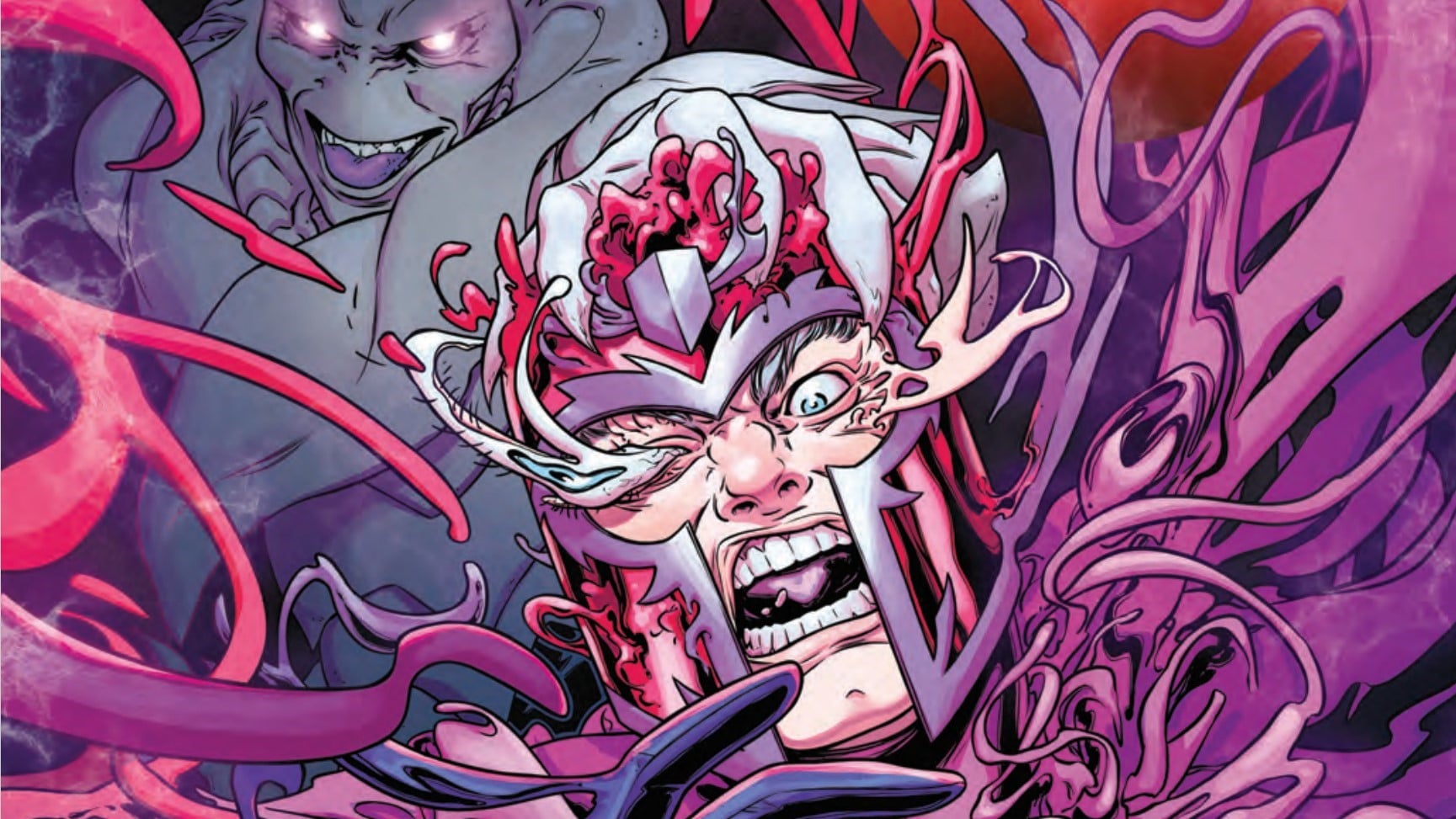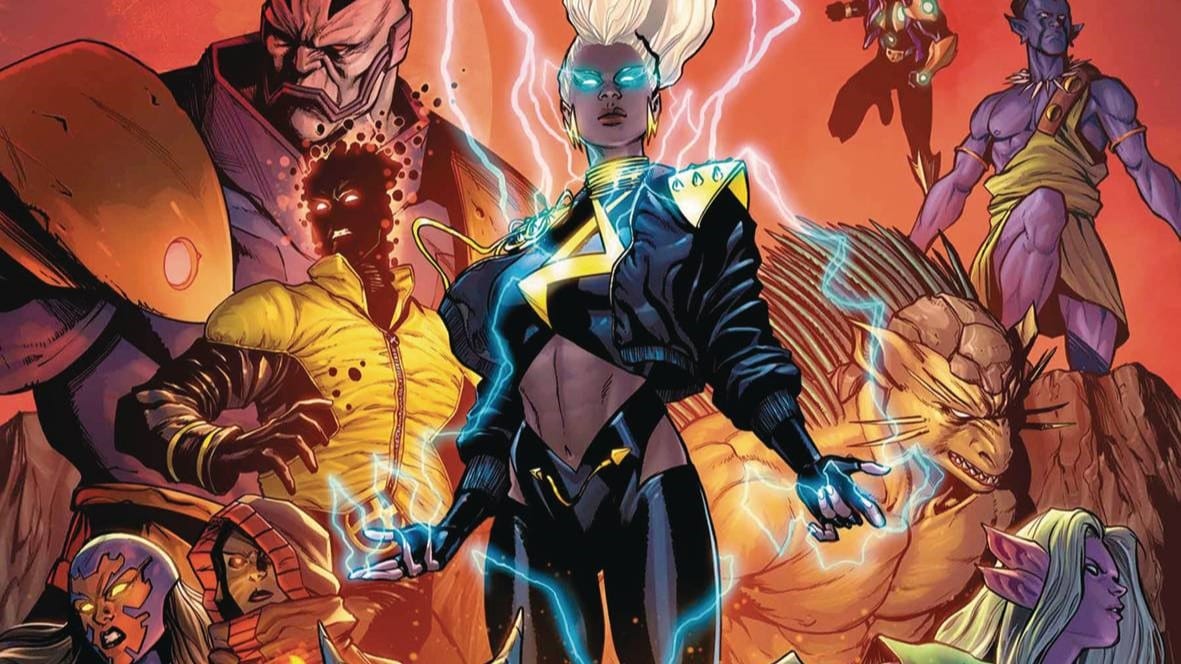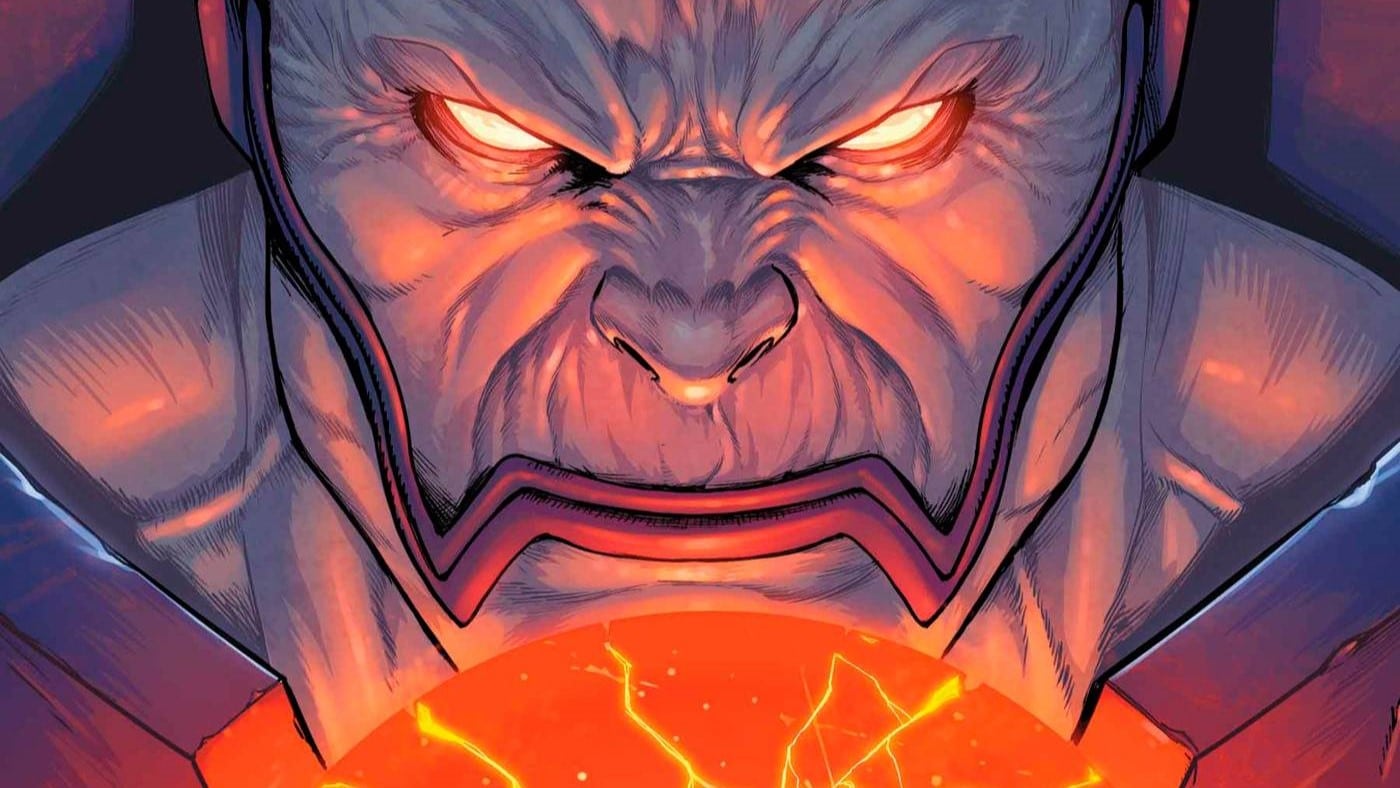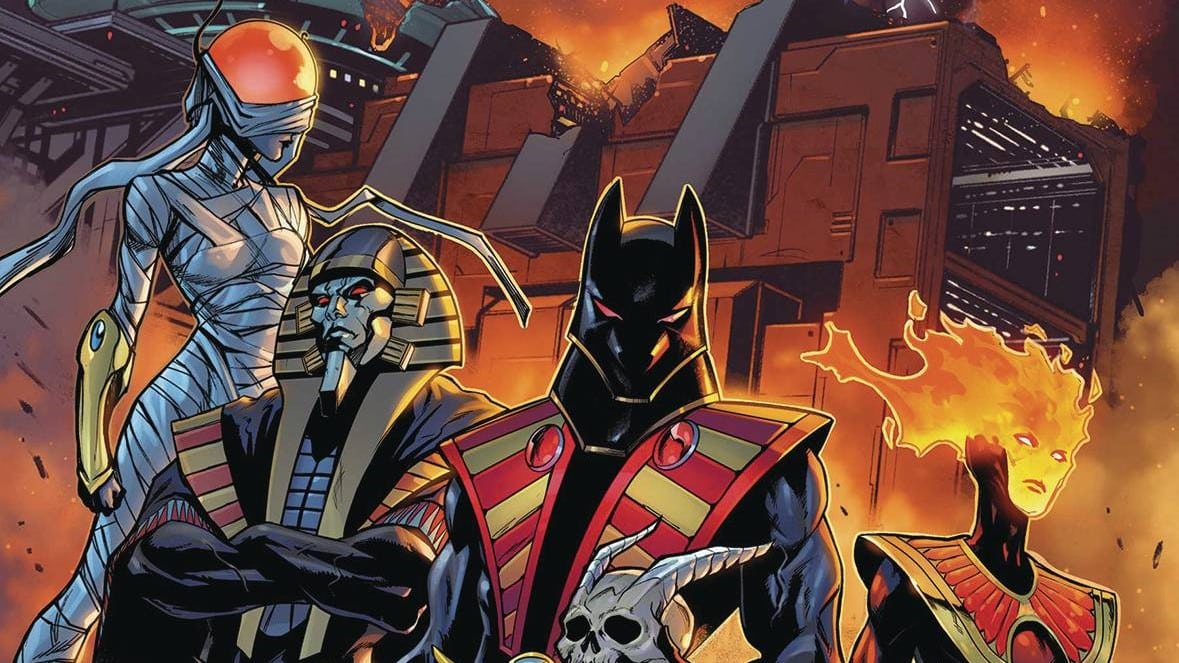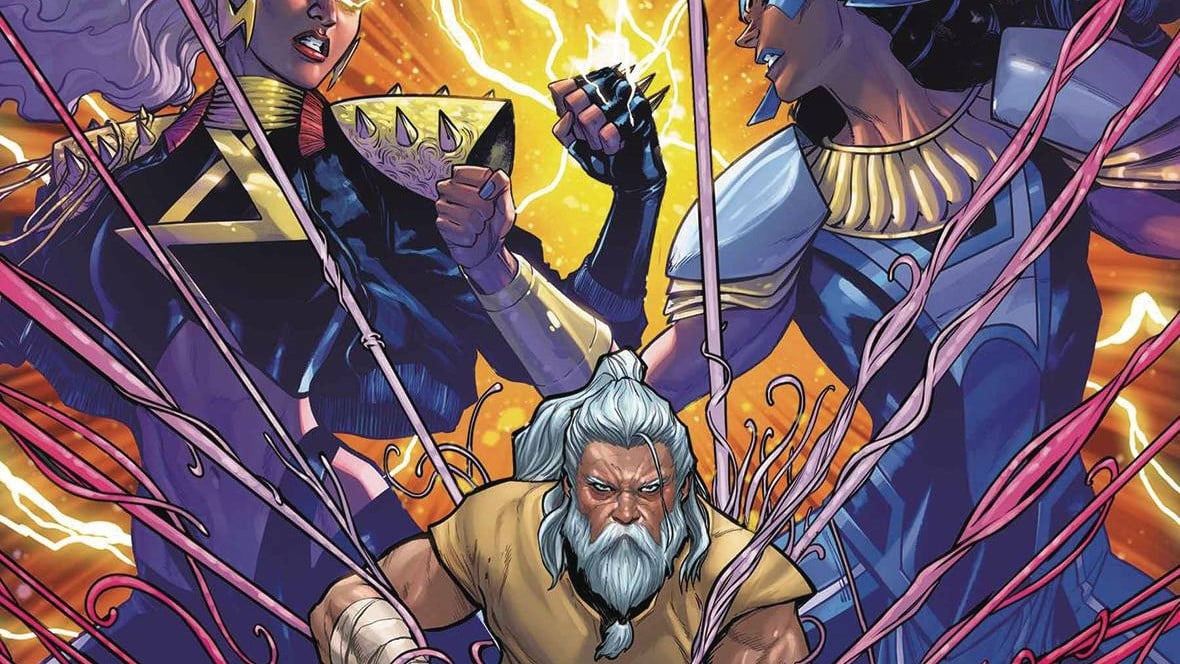Tarn the Uncaring waged war and torture on Arakko for centuries. He’s the most hated being on Mars … and he sits on their ruling council. Abigail Brand has a plan to remedy that — and reap the rewards. So does Roberto Da Costa. But only one of them can win … and Tarn’s going to make at least one mutant pay the price for it. Find out which one in X-Men Red #3, written by Al Ewing, drawn by Stefano Caselli, colored by Federico Blee and Fernando Sifuentes, and lettered by Ariana Maher.
Jude: At 3:45 p.m., I got word our weekly drop of comics was here. At 3:49, I opened up the X-Men Red PDF.
It usually takes me about 6-7 minutes to read a comic through on the first run.
3:50, I smile
3:51, my eyebrow raises
3:53, shock
3:54, eyebrow raises again
3:55, horror
3:55:30, standing up smiling
3:56, cheering
3:57, yelling with glee, on top of my bed, hoping my Zoom is muted still.
Yeah, it was like that.
X-Men Red. Fuck yes.
Vishal: Couldn’t have put it any better, Jude. I screamed aloud multiple times when I read through the issue. Then I reread it, and screamed again. It’s really something special.
Resurrections and Misdirections

Jude: So I’m going to start with an aside:
Mutants *could* emerge from the egg “healed” but choose to maintain their (often debilitating) idiosyncrasies. Cable still has the TO virus. Cyclops still needs protective glasses. Wolverine is still, well, Wolverine.
As soldiers, this is inconvenient (to put it kindly); as an allegory for their humanity (mutantism)? It’s beautiful. They *choose* to embrace their scars.
This is why Charles walking is, to me, a notable treatise of his hypocrisy. But, anyway, digression over.
Vishal: That’s a really fascinating point, Jude, and is something that I think plays into Xavier’s relationship with being a mutant and his goals from the start. Xavier has always been someone who would choose to walk again if he could, with his disability status changing multiple times through Chris Claremont’s tenure on the franchise. Connect that with his other main axis of social disadvantage, and it suddenly makes a lot of sense why he didn’t ever choose to reveal to the world that he was a mutant. For as much as he wants and fights for equality and tolerance, Xavier would like nothing more than to never be seen as different.
Not all of us have that option.
Beyond Xavier, though, we have a very interesting scene of Cable and his own little faction organizing after Nathan’s resurrection: Manifold, who quit Brand’s X-Men, and Proudstar, who certainly has his bones to pick with all of the Krakoan leadership. I noted in the previous issue that Cable’s silence was a bit jarring given my view of the character, and of course that’s what Ewing was intending. I love the addition of this third faction to the mix; even if they aren’t public yet, there’s a lot of chaos that can be sown in this conflict between the X-Men and the Brotherhood.
Jude: That Cable doesn’t trust Brand is almost a given; no one does. That’s essentially the subtitle of the book at this point. I mean, Cable likely has reams of information about what she’s done (or at least what she’s capable of, since the future he’s from probably shifted a little). And if I can ponder predestination, I wonder how much of Cable’s actions are free choice vs. what we (he?) might consider obligation.
In any case, Cable and Proudstar are in cahoots, and apparently have been for a while. For how long? Maybe since the initial run-in at the bar, in issue #1. And with Manifold (My boy is back!) beside them, in on the secret, the stage is set for yet another faction to challenge Brand.
But before that: the fight of the century: Tarn vs Vulcan.
The Enemy of My Enemy

Vishal: I can’t really explain why, but going into this issue I was a little worried that the pace of this book might be moving a bit too slowly. Of course I was wrong. Doubting Ewing has rarely proven fruitful. This fight was something I was concerned would be built out longer, but right after the big title page we get a MASSIVE splash page of the announcement. Vulcan is challenging Tarn for his seat on the Arakkii council. There’s so much intrigue going on — Ororo and Brand have a conversation beforehand that makes clear the Brotherhood is not ignorant of Brand’s schemes.
I absolutely LOVE the giant splash page announcement — it makes the fight feel like a big deal, and as a fan of pro wrestling, I love big deal fights. If you told me this was the main event to a huge Arakkii pay-per-view event I’d believe you, and honestly now I kind of wish that was the case.
Jude, why don’t you tell us about the competitors in this matchup?
Jude: Who exactly is Tarn? Tarn is the worst. He is powerful, certainly — only omegas on the council — but his power is outmatched by his cruelty. We’ve seen that, of course, in Hellions — how his depravity matches, if not surpasses that of Sinister (also: a shared interest in genetics). And like Sinister, everyone on the Arakkii council, if not the entire planet, views him as a pariah.
But while Sinister’s betrayals happen quietly in the now (and will grow in the future … on Mars!), Tarn’s sins are loud, proud and unrepentant.
He ran jails. He imprisoned and tortured the people. He earned his seat by blood — as everyone has the right to — but blood alone does not garner the respect of the people.
This hatred because of cruelty is important to note. It shows the Arakkii are not blind violence worshipers. They have standards. They understand empathy. Their disgust is palpable.
And Vulcan? He is not well. That his facade of (barely lucid sanity) is breaking is no surprise; that this facade limits his power is one. Brand isn’t just playing with fire by coddling and manipulating him; she is lighting fireworks, while bathed in kerosene, betting that someone else will get burned.
Brand believes the person who would take Tarn’s place would be regarded as a savior. Who should — would — reign as a savior king on a planet that “has no thrones?”
Hmmm.
Vishal: The conversation between Brand and Storm prior to this fight is important. There’s a lot more on the line than a seat on the Arakkii council, there’s a measure of status and faith from the Arakkii populace that can’t be bought. This isn’t something Ororo specifically wants from Arakko; it’s not power she craves. But when the alternative is allowing Brand this foothold into a society she clearly does not have the best intentions toward, Storm knows she needs to get in the way.
Jude: We see the Brotherhood together, making sense of Brand’s play. Tarn, after losing to Storm, has done away with all pretense and goes for the kill immediately. They’re not sure if Vulcan has a chance.
But they have decided unanimously that someone needs to take the chance.
Well, almost unanimously.
Magneto, the person best suited to take on the challenge, repeatedly relents. He came to Arakko to rest. Burdened by loss, exhausted from losing battles and people, filled with sadness, self hatred, self-pity. The man who talks like an aristocrat and wears the cape of the gilded is low. Lessened.
He came to Arakko to escape, not to throw himself into yet another battle.
And yet here we are.
Pointedly, he ponders if it’s even his place to rule. And though the Brotherhood tries to convince him otherwise (“Headmaster!”), I have to say, I agree with Magneto’s original sentiment. He doesn’t deserve to tell a group of people whom he just met a month ago how to live. It is the epitome of arrogance — of a white savior complex — to think you can lead and solve the problems of a people you barely know, especially given a weak history of listening.
Yes, he helped create the world (which, again, still feels like a reservation). But creation doesn’t give you the right to rule; even human Gods (generally!) give people free will. I hope and have faith Ewing’s thoughts on this won’t just begin and end with this missive. Appropriation and colonization are always wrong, especially when their goals are “well intended.”
It’s a Fight!

Jude: I haven’t read enough about Gabriel to know if he’s ever fully embraced the vampiric nature of his powers. This use of his power — to depower others — feels poignantly bleak. Proof of this bleakness is how it’s matched by Tarn *doing the same thing.* One wonders if replacing one vampiric megalomaniac with another would be best for the people, but it’s a moot point. Tarn didn’t just learn from Storm not to play with prey — he also learned how to fight depowered. He makes short work of Vulcan, beating him to a literal pulp while making mocking use of his oft-repeated refrain — “I never died!” — before killing him.
And as Tarn gloats over the dead Summers brother, who floats down from on high to challenge the uncaring?
Magneto, of course.
Magneto loves his people. He will sacrifice for his people. Kill for them. Die for them. That’s who he is; that’s who he wants to be, as Bobby so cleverly pointed out.
In retrospect, it’s not surprising to see him challenge Tarn; it was extremely, completely satisfying to see him do so, though.
But the most fascinating and important fight didn’t happen in the arena; it happened in the stands, among two spectators.
Bobby and Isca.
Hoo buddy.
I’ve been thinking about Isca’s powers as a burden since I was introduced to her. I assumed that she doesn’t have a choice but to follow the winner, even if that winner is repugnant. She cannot lose … even if winning means losing family, friends and everything good in between.
But winning, even at those costs, is who she is. That’s her power. And while it may burden her, while it may hurt her, it also makes her — thus she’s chosen to embrace that hurt, much like resurrected mutants choose to embrace their scars. Is she a turncoat? Maybe not intentionally, but she embraces that mantra because she feels that’s who she is, and she has to embrace who she is.
Until she can’t.
I assume Roberto surmised her power was reciprocal, not passive. At some level, she helps determine outcomes. His mental jujitsu — “would that (depowering) work on you?” — sets up the most important line of the work.
“I bet you Tarn wins.”
Isca’s powers are tied to alignment with winning. Her powers have been portrayed as passive. As something she can’t control. But what if she does control who wins? What if her power is active?
What if she’s been empowering a warlord she loathes for 1,000 years? What if she sold out her sister — her sister! — for no reason at all?
Those tears in her eyes? Are they tears from frustration at being challenged and losing? At the loss of her identity?
At guilt for 1,000 years of enabling evil?
Too often those who witness horror comfort themselves by saying how little they could have done, not recognizing that their passivity was, in fact, complicity — enabling the very evil they claimed to hate.
The question isn’t just about what power Isca has; the question is what power we have when we accept injustice as inevitable.
But I digress. Again.
By introducing the brilliantly simple conundrum of, essentially, a Pyrrhic victory (and suffering one, as she kills him for “challenging” her), Roberto effectively nullifies Isca’s power, if not her confidence and (possibly) position on the council.
Brilliant writing. Brilliant execution.
And of executions: Magneto making short work of Tarn using his helmet to mask his power, and then crushing him with said helmet, was pure poetic justice for victor and victim.
Vishal: You’ve really summed up all my thoughts here, Jude! I want to add that Ewing’s portrayal of Sunspot as a genuinely masterful planner has been a delight since he started regularly writing the character in 2016. Roberto’s so meticulous with his planning, his backup-backup plans have backups. He’s someone who can never lose — not because of some mutant ability, but because he’s already accounted for every way his opponent can win. This isn’t some mutant intelligence, it’s not an ability he was born with. It’s something he became after years of growing up as the black sheep of his community. Even back in the classic New Mutants, Roberto was the least liked by his peers (which caused him to run away at least once). And how he learned from that was to make sure that he has a way to account for anything and everything that could go wrong.
So of course, every single step he takes — every word he says — is with clear intention and with a next step already in mind. When he asks Isca about her power, it’s a leading question, even if it doesn’t sound like one. When he tries to convince Magneto to challenge Tarn, he doesn’t require the immediate agreement of his Headmaster. He knows how this will go.
Sunspot is one of my favorite mutants ever, since the original New Mutants and later X-Force, and Ewing’s portrayal of him as an adult has surpassed everyone else’s attempts to write the character. He’s the most interesting and intriguing character in all of Marvel Comics under Ewing’s pen. No matter what he does, there’s always something interesting he’s planning in the background.
Jude: This has been a bloody issue, but the blood was all (well, mostly) purposeful. I have reservations (no pun intended), certainly; It feels like Legion of X is doing more Arakko world-building than the Arakko book.
But still, this is excellent. Intriguing. Unrelenting.
It’s still a favorite, not despite but because of its imperfections.
X-traneous Thoughts
- It’s Father’s Day weekend, so I need more Hope and Cable.
- Or Cable and Cannonball and Sunspot (Vishal remembers…).
- I need Khora as a member of the Brotherhood.
- Or more Khora anywhere, to be honest.
- Is Manifold still dating Shuri?
- Prediction: Magneto abdicates to the Fisher King, eventually.
- Prediction: Sinister takes over the Locus Vile.

